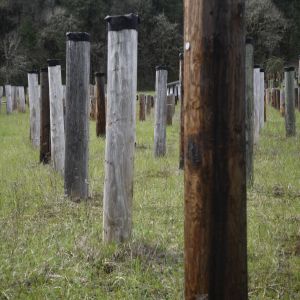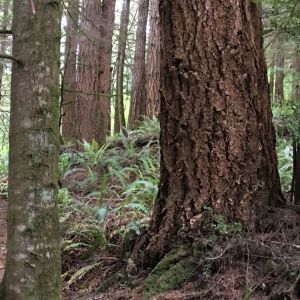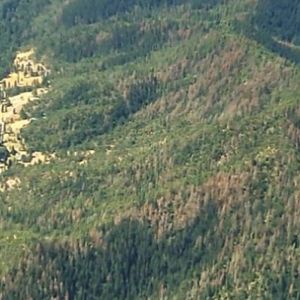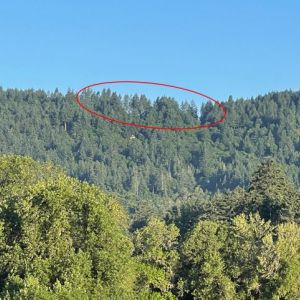The College of Forestry manages approximately 15,000 acres of forestland across 10 separate tracts throughout Oregon. The College aspires for this collection of research and demonstration forests to be globally recognized as a model for actively and sustainably managed forest systems that advance forestry through scientific inquiry, education, community engagement and outreach, and the application of new understanding and Traditional Ecological Knowledge.
The College aims for each research forest to provide opportunities for education, research and outreach that address the economic, social and environmental values of current and future generations of Oregonians and beyond. The research we do is primarily centered around actively managed forests, as active management is central to forest sustainability. Each research forest serves as a demonstration of how actively and sustainably managed forests foster economic prosperity, biodiversity conservation, and resilience amidst disturbances and global change. The collection of research forests strives to support social and cultural values of forests, enhance the wellbeing of local and Tribal communities, and society.
Click through the below summary of recent research conducted on the forests, or browse our database of research going back to 1926. Interested in doing research in the forest? Submit a research proposal!
Wildlife Research
Wildlife research is the focus of a number of studies, both past and present, on the Research Forests. The earliest wildlife study recorded in our database dates back to 1942-1943; A Comparative Vertebrate Ecology of Typical and Atypical Oak Areas. Through the years the Research Forests have hosted such studies as Blue and Ruffed Grouse distribution, the role of beaver dams in providing fish habitat, Red Tree Vole mobility, butterfly ecology, and Purple Martin conservation. Recent research on invertebrate pollinators and creation of snags for cavity nesters are highlighted below
Study Title: Invertebrate pollinators in the managed conifer forests of the PNW
Researchers: Jim Rivers, Matt Betts, Rachel Zitomer
Summary: Little is known about the effects of intensive forest management on pollinator habitat. This study will help fill that research gap, with a focus on invertebrate pollinators in the managed conifer forests of the Pacific Northwest.
Study Title: Purple Martins on the OSU Research Forest
Researchers: Joan Hagar, David Vesely, Lorelle Sherman
Summary: The OSU Research Forest has been cooperating with USGS and Oregon Wildlife Institute in a study of purple martin use of artificial and natural nest sites in regeneration harvest units. The goals of the project are 1) to bolster purple martin populations by providing artificial nest sites in harvest units where suitable natural nest cavities were unavailable; 2) to quantify characteristics of created snags used by purple martins for nesting; 3) to examine the potential of purple martins to transfer from artificial to natural nest sites; and 4) document dispersal patterns among purple martin colonies by tracking marked birds.
Study Title: Evaluating Habitat Potential of Snags
Researchers: Joan Hagar, Jim Rivers, Amy Barry
Summary: Snags provide critical habitat for nearly one-third of wildlife species in forests of the Pacific Northwest, so historic declines in snags are thought to have had a strong impact on biodiversity. Using snags that were created by topping mature Douglas-fir trees (Pseudotsuga menziesii) as part of the OSU College of Forestry Integrated Research Project, we measured characteristics of 731 snags and quantified foraging and breeding use of snags by birds 25-27 years after their creation.
Recreation Research
The McDonald and Dunn Forests located directly north and west of Corvallis host more than 155,000 recreation visits each year. These visitors hike, bike, run, walk dogs, ride horses, observe nature, birdwatch, and hunt on a system of nearly 30 miles of trails and 110 miles of roads. Managers rely heavily on recreation research to make informed decisions about recreation use and forest management.
Study Title: Recreation Survey Results from McDonald and Dunn Forests
Researchers: Chad Kooistra, Ian Munanura
Summary: Acting on its mission to provide quality recreation and learning opportunities, the OSU Research Forests funded researchers Chad Kooistra and Ian Munanura in a research study to survey recreation users of the McDonald and Dunn Forests in 2017. These data, and the recommendations made by the authors, are incredibly valuable to Forest Managers in making decisions for the Forests’ Recreation and Engagement Program.
Utility Pole Research
To reduce decay and insect damage, existing utility poles are treated with wood preserving chemicals. At the pole farm, researchers from OSU test different preservatives for their effectiveness, longevity, and environmental impact. This knowledge allows companies to use the least amount of chemical at the lowest frequency while obtaining optimal results. This research also informs climatic considerations, which vary by region and significantly affect how much preservative is needed to treat a pole. As you can imagine, a pole in rainy Western Oregon will need more protection than a pole in Oregon’s drier Eastern side. Because of their high value, we want them to last as long as possible.
Study Title: Utility Pole Research
Researchers: Gerald Presley, Jed E. Cappellazzi, Matthew Konkler
Summary: In 1980, OSU formed the Utility Pole Research Cooperative, made up of utilities, chemical companies, wood treaters, and inspection agencies. As a third party member, OSU provides these groups with accurate, objective data to help them operate more effectively and efficiently. Consumers also benefit from reliable, long-lasting products. Using preservatives more efficiently helps reduce environmental exposure to chemicals, and the longer life of the pole reduces utility costs and the need to harvest trees.
Forest Engineering Research
There is a long history of conducting forest engineering and timber harvesting research on the Research Forests. Forest engineering research studies the mechanical and economic requirements of forest operations with the biological requirements of the forest and the need to protect soil and water resources. Research in timber harvesting looks specifically at the methods, technologies, and techniques for harvesting trees to improve machine and human productivity, protect soils, streams and other resources, and improve worker safety. Timber harvest equipment and machines are constantly changing and continued research in this arena is important for finding new and innovative ways to harvest timber in a safe and efficient manner.
Study Title: Forest Road Research
Researchers: Ben Leshchinsky, Kevin Boston, Erica Kemp
Summary: Aggregate roads are the primary means of access to managed forestlands in western Oregon, but may facilitate sediment transport during rainfall, especially with traffic from heavy trucks. To evaluate a potential treatment to this problem, a heavily-instrumented field test was performed on a reconstructed aggregate forest road in OSU’s Dunn Forest to test the potential of geosynthetic materials to sequester road sediment and improve road performance during wet-weather hauling.
Study Title: Landslide Research
Researchers: Ben Leshchinsky
Summary: A groundbreaking study supported by the Cascadia Region Earthquake Science Center (CRESCENT) is underway to answer a fascinating question: Why did the last Cascadia earthquake appear to trigger few landslides? Researchers hypothesize that forest structure may play a role in damping seismic waves, reducing their impact on hillslopes in particular settings. This study explores whether certain types of forests act as natural shock absorbers during earthquakes, making ground shaking less severe compared to areas with different vegetation structure and/or land use.
Climate Change, Carbon and Forests Research
Because of increasing concern about climate change induced by atmospheric accumulation of greenhouse gases, the quantification of carbon stored within ecosystems has risen high on global scientific agendas. Forests provide natural mitigation strategies, which drive the uptake of atmospheric carbon dioxide through photosynthesis. In the United States, forest land offsets 11% of nationwide greenhouse gas emissions through net sequestration of carbon within woody biomass (Smith et al., 2019).
Study Title: Carbon Inventory for the McDonald-Dunn Research Forests
Researchers: Temesgen Hailemariam, Catherine Carlisle
Summary: Forest carbon estimates are necessary for regional accounting and analyses. Quantification of carbon stock on specified tracts will help forest managers to develop and implement plans to enhance carbon sequestration capacity.
Study Title: Recent Douglas-fir Mortality in the Klamath Mountains Ecoregion of Oregon
Researchers: Max Bennett, Dave Shaw
Summary: We used data from the USDA Forest Service Aerial Detection Survey and ninety-six field plots to explore the relationships between physiographic and climate variables and Douglas-fir mortality. Our results provide strong evidence for a decline spiral in which Douglas-fir growing on hot, dry sites (predisposing factor) are further stressed by drought (inciting factor) and are then exploited by the flatheaded fir borer (Phaenops drummondi) and other secondary biotic agents (contributing factors), resulting in decline and mortality. At the landscape scale, Douglas-fir mortality increased as average annual precipitation declined and average climatic water deficit increased.
Silviculture Research
Silviculture, from the Latin term, silva, (meaning forest or woodland) is often described as the art and science of forest cultivation. With a desired forest condition or objective in mind, silviculturists manage tree density and composition through harvest, reforestation, and other stand treatments. Silviculture treatments can be used to create conditions for optimal timber production, accelerate structural diversity for wildlife habitat, enhance forest health and even promote old-growth characteristics. Silvicultural research on the OSU Research Forests include both short- and long-term studies; the latter involving measurements taken over decades with some still ongoing. Researchers test new and innovative practices and analyze tree and forest responses which are published in scientific journal articles. The research conducted here on the Research Forests helps inform and improve forest management on private, county, state, federal and tribal lands.
Study Title: The Impact of Forest Management Activities on Forest Aesthetics
Researchers: Bryan Begay, Bogdan Strimbu, Stephen Fitzgerald
Summary: In 2020, director of the research forests Stephen Fitzgerald, forest manager Brent Klumph, associate professor of forest engineering Bogdan Strimbu, graduate student Bryan Begay, and forestry student workers employed a three-phase technique to plan harvests when there are potential viewshed impacts. This project was part of Begay’s larger master’s research project exploring aesthetic silviculture.
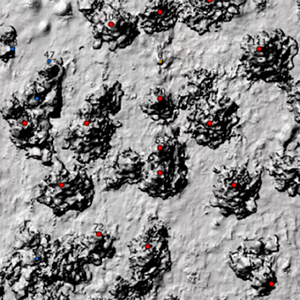
Study Title: Remote Sensing Validation for Tree Location and Height in the Oberteuffer Research and Education Forest, Oregon
Researchers: Joe Roush, Michael Roush, Jacob Callahan
Summary: This study validates the use of UAS-derived RGB imagery and Structure from Motion (SfM) analytical tools to accurately estimate tree locations and tree heights. With accuracy as high as (+/- 5%) for tree height and the ability to accurately identify individual tree locations, this methodology should be expected to supplement and significantly reduce the time and expense of traditional field-based collection of forest metrics.




